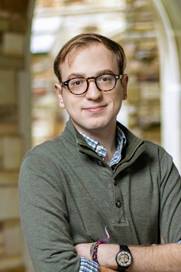 Mason Levy ’15
Mason Levy ’15
Hometown: Cincinnati, OH
Majors: Physics and Theatre
Research interests: I helped Dr. Shubho Banerjee of the Department of Physics in his modeling and research over the summer after my sophomore year and throughout my junior year. He has derived closed-form expressions that describe the interaction between two charged spheres. We spent the time verifying these results by using Mathematica to analyze and graph the equations that were developed. We also came up with an approximation for these interactions that is easier to use than the closed-form expression and significantly more accurate than what currently exists.
Academic interests: I am interested in pretty much everything. More specifically, designing things (be it a theatrical production, a set for a show, a theoretical model of how something works, a physical system like an airplane, or something else entirely) really fascinates me and is what I pursue academically. Theatre and physics are the main ways that I express this need to create and design.
Extracurricular activities: McCoy Theatre Scene Shop Foreman, Sigma Nu Fraternity, Sigma Pi Sigma physics honor society, set designer for McCoy productions Thebes and And Baby Makes Seven.
Tell the story of how you got to Rhodes College.
When I was applying to college I was looking at several liberal arts schools across the nation, as I wasn’t quite sure if I wanted to pursue physics, theatre, Spanish, or something else entirely. A lot of the schools I looked at had great programs with which I could explore all the different fields that interested me, but Rhodes won me over. First off, it was in the heart of a lively city (which is fairly rare for liberal arts schools), and second, it offered me a fine arts fellowship to come and be a part of the theatre department.
How have you changed since beginning your studies at Rhodes?
I wouldn’t really say I’ve changed since coming to Rhodes. I’m still me, I’m still Mason, you know? My college years have been more a time of growth, as I learned new things and had new experiences that helped shape my perspectives. One excellent example of this is my fraternity, Sigma Nu. The brotherhood and social aspects of fraternity life provided me an excellent means of transitioning from adolescence to adulthood. I’ve definitely grown both intellectually and socially since my freshman year.
Tell us a little about majoring in two subjects—theatre and physics—which on the surface seem to have little in common.
I am often asked why I chose to study an art and a science: there is a popular image of the two fields being very far from each other in content and form. Many people look at physics or math and are immediately overwhelmed. They see all of these crazy looking symbols and immediately give up on understanding them. However, all physics is doing is expressing the world we see in extremely useful ways. It’s a language really (with all of the advantages and disadvantages that any language has), and it takes a skilled writer to compose a work of physics that really does justice to nature and our ability to create.
To me, physics and math are extremely artful and elegant modes of expression. Unfortunately, I can’t effectively communicate how true this is in English, but if you start learning to read and write math and physics, you may begin to understand what I mean. There are countless mediums that allow me to communicate and express myself, but I am drawn to physics and theatre in particular. This is because of the elegance of what each can accomplish and the powerful manner in which this is done. Anyone who has sung along to “Let It Go” or been wowed by what technology does can relate to how theatre and physics are both vital modes of expression.
Finally, studying both physics and theatre has certainly given me a broad and varied understanding, as a liberal arts education aims to do. Being involved in these two seemingly disparate fields has helped me develop a wider appreciation of general knowledge and has helped me to say “I like learning,” rather than “I like math,” or “I like history.”